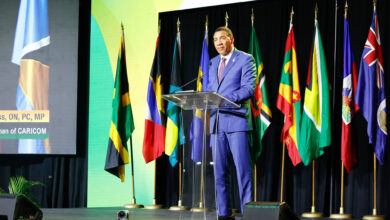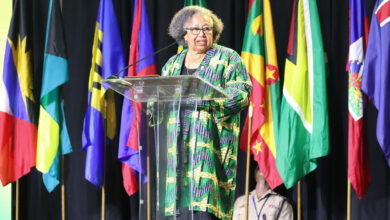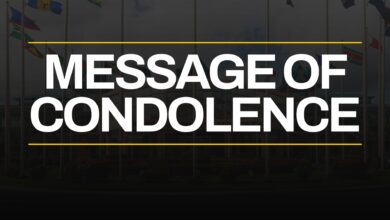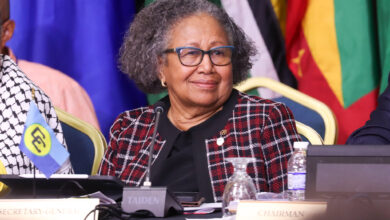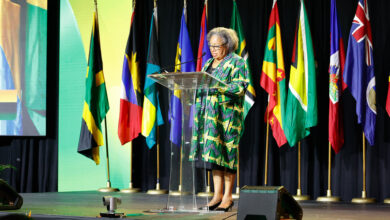The Eleventh Japan-Caribbean Community (CARICOM) Consultation was held at the International Conference Hall of the Ministry of Foreign Affairs in Tokyo from February 16 to 17, 2006. The delegation of CARICOM was headed by Ambassador Lolita Applewhaite, Deputy Secretary General of the CARICOM Secretariat and that of Japan by Mr. Mitsuo Sakaba, Director General of the Latin American and Caribbean Affairs Bureau, Ministry of Foreign Affairs of Japan.
In the Opening Remarks of the Consultation, Mr. Katsutoshi Kaneda, Senior Vice-Minister for Foreign Affairs of Japan extended a warm welcome to the CARICOM delegation and pointed out that Japan and CARICOM had strengthened and deepened their relations, achieving very fruitful results through the steady implementation of the “New Framework for Japan-CARICOM Cooperation for the Twenty-First Century” (hereinafter referred to as “the New Framework”) since its adoption by the First Japan-CARICOM Ministerial Meeting in November 2000.
Ambassador Applewhaite in her response stated that the Consultation was taking place at a critical juncture in the history of the CARICOM integration movement as on January 1, 2006 the long awaited dream of the CARICOM Single Market became a reality. She noted that this milestone development paves the way for the Region to operate in a single economic space and to strategically interface with the global market place. She commended Japan for its active support of the Caribbean integration process.
Both sides regarded the Consultation as an opportunity to review the relations between CARICOM and Japan, conducted under the New Framework, as well as to follow up on discussions initiated during the Tenth Consultations, held in August 2004. They also finalized preparations for the Second CARICOM-Japan Ministerial Meeting, including the formulation of the Joint Action Plan.
Both sides recognized that the Joint Action Plan would give direction for cooperation over the next five years in the focused areas among those mentioned in the New Framework. Both sides also shared the view that “Partnership for Stability and Development” and “Enhancement of Cooperation in International Fora” – were two critical pillars upon which the Joint Action Plan would be based.
Both sides reviewed the projects and the programmes executed under the New Framework over the period November 8, 2000 to February 16, 2006 in the areas of good governance, poverty reduction, environment and disaster prevention, the development of small and medium sized enterprises, tourism, fisheries, agriculture, trade and investment, information and communications technology, cultural exchanges and exchanges of people.
The CARICOM side reiterated the importance of environmental protection and natural disaster management and mitigation, because of the Region’s vulnerability to natural disasters. The Japanese side confirmed its readiness to continue its support to CARICOM’s efforts in this area.
The opportunity was further taken by CARICOM to update the Japanese side on the implementation of the CARICOM Single Market which came into effect on January 1, 2006 and to outline measures for the establishment of the CARICOM Single Economy. The CARICOM side conveyed its appreciation for the support which Japan has given to this process. The Japanese side welcomed the launch of the CARICOM Single Market as scheduled and expressed its continued support to CARICOM in order to build the Region’s capacity for management of the Single Market and Economy.
The CARICOM side expressed its gratitude for the generous assistance provided by Japan in the several areas of the economic cooperation programme. The Japanese side confirmed its willingness to continue its cooperation.
In focusing on the programme for future cooperation, both sides recognized that under the “Partnership for Stability and Development” section of the Joint Action Plan, they would pursue cooperation in the following areas: Environment and Disaster management and mitigation, CARICOM Single Market and Economy, Human and Social development, promotion of trade, tourism and investment, sustainable growth, reinforcement of good governance, information and communications technology and arts and culture.
Both sides expressed their satisfaction with their close cooperation in international fora, including the United Nations and the World Trade Organization as well as other organizations where they enjoyed membership. Under “Enhancement of cooperation in international fora” in the Joint Action Plan, they decided to continue developing this relationship and to collaborate further on issues such as the global environment, the economic sustainability and the promotion of peace and stability in their two Regions.
Both sides, recognizing the importance of regional cooperation, decided to continue to work towards a mutually agreeable consultation framework for the efficient and effective implementation of such cooperation.
The Japanese side drew attention to the New Development Initiative for Trade which was announced by Prime Minister Junichiro Koizumi prior to the Sixth WTO Meeting in Hong Kong in December 2005 and indicated that the new initiative could be utilized by CARICOM States for concrete projects of interest to smaller economies. It was noted that Japan would hold consultations with CARICOM countries to identify project proposals that could be implemented under the Initiative. The CARICOM side welcomed the opportunity that the Initiative would allow for CARICOM to improve productivity, competitiveness and diversification. The CARICOM side also welcomed Japan’s intention to discuss appropriate, special and differential treatment for smaller economies in the context of the Doha Development Agenda.
With particular reference to the United Nations, both sides shared the view on the need for comprehensive reforms of that body, including the General Assembly, the Economic and Social Council (ECOSOC), the Secretariat and the Security Council.
Both sides highly appreciated the role played by the Japan-CARICOM Friendship and Cooperation Fund for enhancing friendly relations between Japan and CARICOM Member States. They decided to promote further cooperation through full utilization of the Fund.
The CARICOM side welcomed the opportunity to hold discussions with the Japan External Trade Organization (JETRO) and the Japan Business Federation (Nippon Keidanren) with a view to promoting relations between the private sectors of CARICOM and Japan.
Both sides consulted on the date and venue of the Second CARICOM-Japan Ministerial Meeting and decided that they would recommend for adoption the Joint Action Plan by the Ministers at that Meeting. The representative of Antigua and Barbuda reconfirmed his Government’s commitment to host the Second Ministerial Meeting. Both sides accepted the offer with appreciation. In this regard, the agenda and the exact date for the Second Ministerial Meeting are to be discussed through diplomatic channels.
The CARICOM side expressed its appreciation for the warm welcome accorded to its delegation and for the kind hospitality extended by the Government of Japan.
Tokyo, Japan

